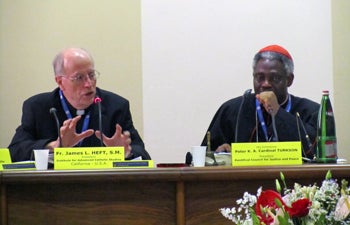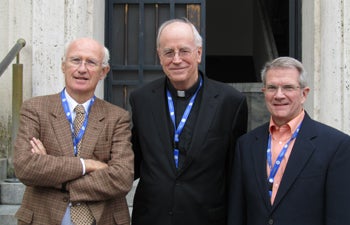Institute for Advanced Catholic Studies at the Vatican
When it comes to the Catholic tradition, the believer must also be the thinker.
“If you’re going to be a believer, no one should ever suggest that you check your brain in at the entrance of the church,” said Fr. James Heft, Alton M. Brooks Professor of Religion in USC College.
As chair of each of the six sessions of an international symposium Oct. 15 and 16 at the Vatican, Heft invited leading Catholic social doctrine academicians and practitioners, economists and business leaders, who traveled to Rome to discuss Pope Benedict XVI’s latest encyclical, Caritas in veritate (Charity in Truth), and how it applies to the United States.
The Vatican’s Pontifical Council for Justice and Peace invited the Institute for Advanced Catholic Studies (IACS) located at USC and linked to the College to organize the symposium. Heft, president and founding director of IACS, expected an informed, spirited and open discussion among the scholars and practitioners. He was not disappointed.
Published in June of 2009, the encyclical presents the pope’s thoughts on how economic progress can be made toward the common good for all people. Arguing that love, truth and honest business practices grounded in relationships of trust are essential if humanity is to find an adequate response to social problems, the pope addresses political, business and religious leaders, financiers and heads of aid agencies.
A Vatican veteran described the symposium as revolutionary, at least by the standards of Roman meetings. Each of the 27 participants submitted 10-page papers on the theme six weeks before the symposium, which allowed the participants to read the papers before they met in Rome. No papers were read in Rome. There, the papers and the pope’s social encyclical were vigorously debated around a large oblong table.
“We brought together a group of people who are not the usual suspects,” Heft said of himself; Dan Finn, professor of theology and William E. and Virginia Clemens Professor of Economics and the Liberal Arts at St. John’s University; and Paul Caron, a retired 20-year leader of J.P. Morgan in Europe.
“They were people with backgrounds in government, private business, ethics, theology and people who have spent a tremendous amount of time thinking about social and economic development, wrestling with how best to raise the standard of living for everyone, especially poor people,” Heft said. “We put these scholars and business leaders in a setting where we could have an extended period of time to discuss honestly and openly the issues raised by this particular encyclical.”
Cardinal Peter Turkson, president of the Pontifical Council for Justice and Peace, participated in the symposium. His deputies, Bishop Mario Toso, Dr. Flaminia Giovanelli and American Monsignor Anthony Frontiero did as well.

Invited by the Vatican to organize a symposium discussing Pope Benedict XVI’s latest encyclical, Father James Heft makes a point while Cardinal Peter Turkson listens during a session in Rome. Photo credit Gary Adler.
Turkson said the council specifically sought out the IACS to organize and lead the international effort. The Cardinal pointed out that the institute’s “aim is to help all people, through opportunities for careful and focused study on the Catholic intellectual tradition, to come to a greater understanding, and by extension, a greater acceptance of the wisdom and the treasure of the Catholic faith and its teachings, as well as learning wisdom from beyond the church.”
“This is not only an academic enterprise, but the work of evangelization,” he said. Commenting on the experience, the cardinal added that the symposium “was the beginning of a fruitful relationship, and I reiterate my gratitude to Father Jim Heft, Professor Dan Finn, Paul Caron and all those who worked to make the symposium a success.”
John Allen of the National Catholic Reporter covered and participated in the symposium, and singled out seven themes from the discussions: language; gift vs. justice; distinctiveness vs. uniqueness; caution about blame; women and gender issues; dialogue with practitioners; and tribalism in the United States church.
In the discussion about gift vs. justice, for example, these questions were posed: What term best expresses our responsibility toward the poor? Should we conceive of it under the rubric of freely given gifts, or is there a real duty in justice towards the poor that demands action, rather than merely inviting it?
The debate was lively, Allen reported, with some participants arguing that the concept of “gift” waters down the obligation to do justice, while others insisted that “gift” doesn’t weaken the obligation one has to the poor, but rather augments it with a new spiritual perspective.
One speaker felt that since “love can grow cold,” sometimes insisting that helping the poor is also one’s duty will insure that justice is done. Another argued that duty alone may not be enough to sustain the long-term motivation necessary to address poverty and other social ills, while the delight of giving gifts perhaps can.
After reading Caritas in veritate, some participants, Allen noted, felt that the encyclical should have been more carefully written, and should have reflected greater caution in attributing blame for the financial crisis, especially to people who do not believe in God. Since the encyclical is addressed to all people of good will, it would have been better to acknowledge that there are non-believers who are deeply committed to the common good and believers who can be part of the problem.
Some discussions, Allen added, focused on what was absent in the encyclical, namely a discussion of gender issues, women, and the amply documented key contribution they make to economic development.
“Why are Catholics taking this topic up?” Heft asked. “Because we’re concerned not just about eternal salvation, but we’re also concerned about goodness and justice in this present life. If people are oppressed, if people have no way to feed themselves, or to work, human dignity is threatened if not destroyed. Human dignity, according to the major religions of the world, is rooted in being created in the image and likeness of God. If we do not work to create the conditions that support human dignity in this life, we should think twice about whether we’ll have a secure place in the next life.”

The architects of the symposium left to right Paul Caron, a retired 20-year leader of J.P. Morgan in Europe; Father James Heft; and Dan Finn, professor of theology and William E. and Virginia Clemens Professor of Economics and the Liberal Arts at St. John’s University, confer at the symposium in Rome. Photo credit Gary Adler.
USC President Emeritus Steven Sample had predicted great scholarly achievements from IACS when it was created in 2002.
“USC’s institute is devoted to the Catholic tradition,” Sample said then. “However, this research is being done in an ecumenical and interreligious way. We welcome at the institute scholars from other branches of Christianity and from other religions. We’re receptive to researchers who may have different points of view because, in this day and age, no religion can afford to be ignorant of other religious traditions, doctrines, and practices. All religions must learn from each other, work together, and promote the greater good for all people around the world.”
USC College Dean Howard Gillman acknowledged the institute’s record of tackling issues of great importance, such as the pope’s encyclical.
“And it’s doing so in a way that upholds and advances the highest scholarly values of a world-class research institution,” Gillman said. “It’s a great resource for our students and faculty, and for everyone interested in inter-faith understanding and intellectual engagement on fundamental questions.”
Heft, Finn and Caron will produce a book based on the symposium. As a result of an international conference IACS held at USC in June 2008, The True Wealth of Nations was recently published by Oxford University Press. Two other books produced by the institute have recently been published by Oxford: Learned Ignorance, which includes papers by Jewish, Catholic and Muslim scholars around the theme of intellectual humility; and The Crisis of Authority in Catholic Modernity, a cross-disciplinary study of the effectiveness of church leaders.
The True Wealth of Nations, edited by Finn, represents only one research focus in an ongoing project that examines the many facets of Catholic social teaching and tests empirically whether, if applied appropriately, can result in a sustainable wealth for everyone.
“We think it can be tested empirically,” Heft said. “We’re not asking people to take it on faith.”